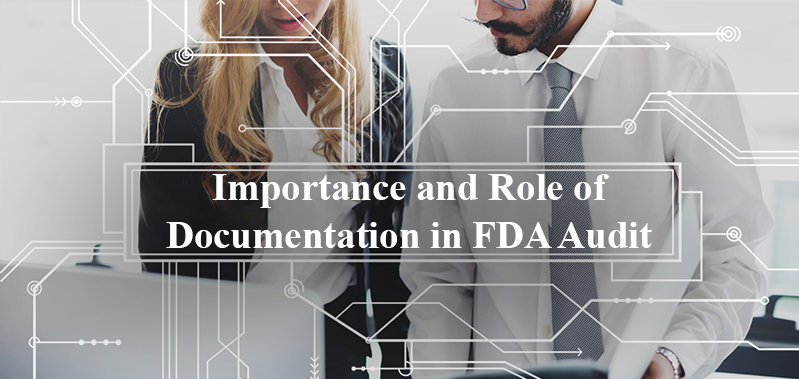
Importance and Role of Documentation in FDA Audit
In the pharmaceutical industry, FDA audits are a very daunting process that requires truthfulness. The FDA has intensified its surveillance of regulated industries. Although companies are expected to meet their regulatory requirements, the manner in which company staff handle an audit and interact with FDA inspectors can significantly impact the outcome. Effective interaction can lead to a successful FDA audit, while ineffective interaction can result in severe consequences and staggering costs.
If you are in a regulated industry like pharmaceuticals or medical devices, an inspection by the U.S. Food and Drug Administration (FDA) is inevitable. The Food, Drug, and Cosmetic Act mandates that "Registered domestic drug establishments shall be inspected by the FDA at least once every two years." Depending on various factors, these inspections can occur even more frequently.
The outcomes of these inspections can profoundly impact your business, regardless of your diligence in compliance. The way you and your colleagues conduct yourselves and interact with FDA inspectors can influence the inspection results. Engaging with inspectors is not instinctive; it requires learning and mastering effective techniques to ensure positive outcomes. Therefore, preparing thoroughly for these interactions is crucial for safeguarding your business against potential adverse consequences with 2024 best practices for FDA Audit.
Compliance in the Pharmaceutical Industry
An FDA audit is a routine inspection conducted by the Food and Drug Administration to ensure regulated facilities, such as drug manufacturers, comply with established standards. Typically occurring every two years, these audits can happen more frequently for various reasons, including routine checks, new drug applications, or addressing complaints and safety concerns.
During an FDA audit, inspectors review systems and documents using the batch/test approach. They also conduct an exit interview with the management team to discuss their findings. The primary goal of these audits is to ensure that pharmaceutical and other manufacturing organizations adhere to the FDA's standard operating procedures (SOPs), Current Good Manufacturing Practices (cGMPs), and other regulatory guidelines.
Compliance with these guidelines is crucial for protecting human and animal safety and well-being. Given the complexity and multifaceted nature of pharmaceutical manufacturing, ongoing audits are essential. Additionally, regulatory guidelines are periodically updated, prompting the FDA to conduct inspections to ensure continued compliance.
The FDA's role in monitoring pharmaceutical compliance with cGMP regulations ensures the quality of drug products. These regulations set minimum requirements for the methods, facilities, and controls used in manufacturing, processing, and packing drug products or medical devices. The FDA's pharmaceutical quality resources and regulations aim to guarantee that products are safe for use and contain the intended ingredients and strength. Similarly, the World Health Organization (WHO) provides Good Manufacturing Practice (GMP) guidelines, covering aspects like computer system validation and the qualification of systems and equipment in the pharmaceutical industry.
2024 Best Practice for FDA Audit
Importance of truthfulness
Providing accurate and honest information ensures compliance and fosters trust with the inspectors. Any attempt to conceal or mislead can result in severe consequences, including hefty fines or legal action. Truthfulness helps in addressing any issues promptly and demonstrates a commitment to quality and regulatory compliance.
Importance of Knowledgeability and Confidence
Being knowledgeable and confident during an FDA audit can significantly influence the outcome. Staff members should be well-versed in the company's processes, regulations, and documentation. Confidence in their knowledge reduces the likelihood of errors and helps in effectively addressing the inspector's queries.
FDA Tricks to Elicit Information
FDA inspectors may use various techniques to elicit information, such as open-ended questions, silence, or revisiting topics. Open-ended questions encourage detailed responses, providing more insights into the company's operations. Inspectors might also use silence strategically, prompting individuals to fill the gap with additional information. Revisiting topics can help uncover inconsistencies or further details that may have been initially overlooked.
Behavior During the Inspection
Professional behavior during an FDA inspection is crucial. Employees should remain calm, respectful, and cooperative throughout the process. It's important to listen carefully to the inspector's questions and respond accurately without volunteering unnecessary information. If a question is unclear, seeking clarification is better than making assumptions.
Importance and Role of Documentation
Comprehensive and well-organized records demonstrate the company's compliance with regulatory requirements. All documents, including SOPs, batch records, and training logs, should be readily accessible and up-to-date. Accurate documentation provides evidence of consistent quality control and operational practices. During the audit, inspectors will review these records to verify compliance. Gaps or inconsistencies can lead to findings that may require corrective actions. Maintaining thorough documentation ensures transparency and accountability, which are essential for passing FDA audits. Proper record-keeping also facilitates internal reviews and continuous improvement in operational processes.
Effective Communication Skills
Effective communication skills are vital during an FDA audit. Clear and concise responses to the inspector's questions help prevent misunderstandings and ensure that the information provided is accurate. Employees should be trained to communicate effectively, focusing on factual information and avoiding unnecessary elaboration. Good communication also involves documenting conversations and agreements during the audit for future reference. Strong communication skills can help build a positive rapport with the inspectors, making the audit process smoother and more efficient.
When it comes to FDA audits, good training, including compliance knowledge and best practices, is most crucial. The pointers mentioned above are the 2024 best practices for FDA audits and help you evade bad inspection.






FDA audit is such a daunting process and I hope these tips will surely help us all.